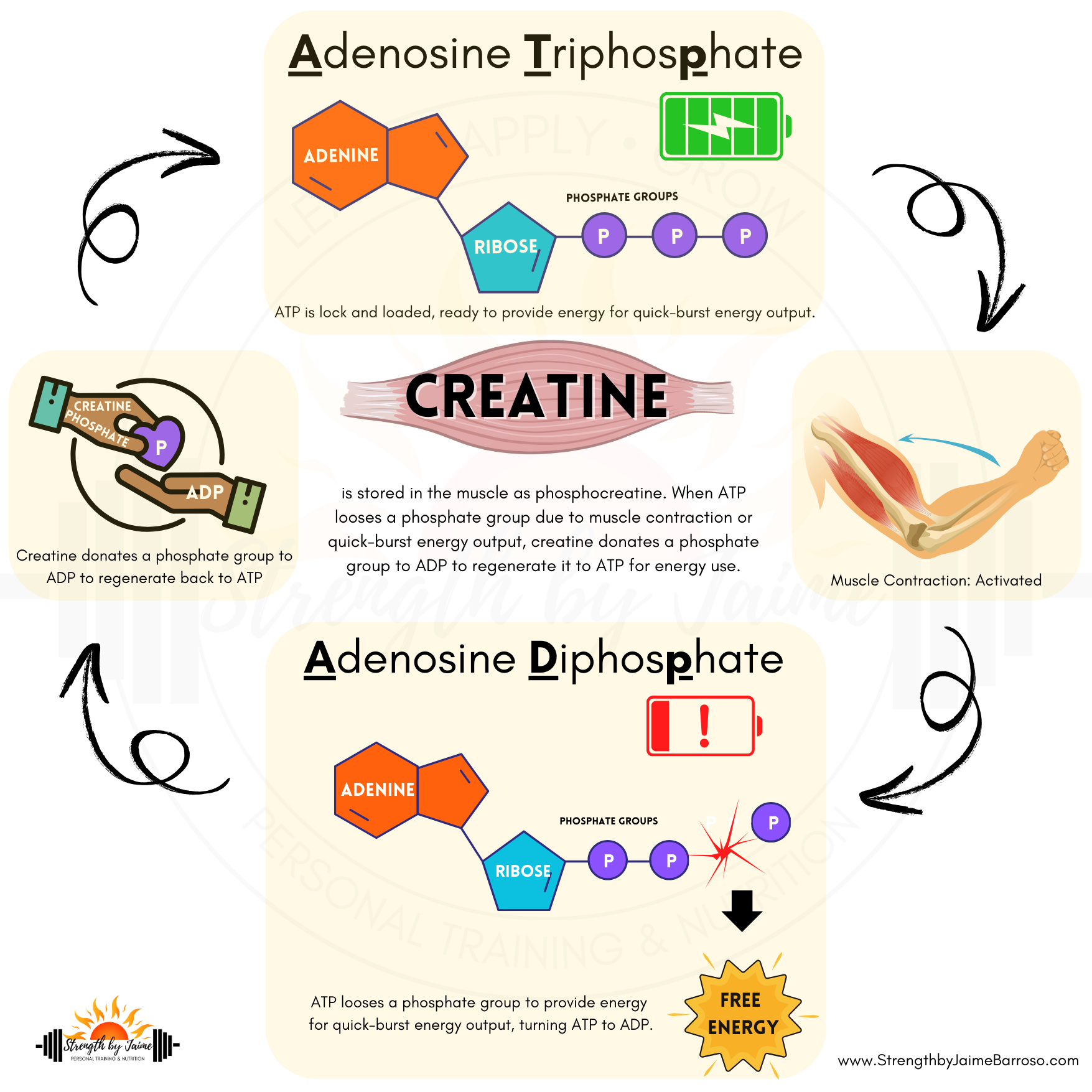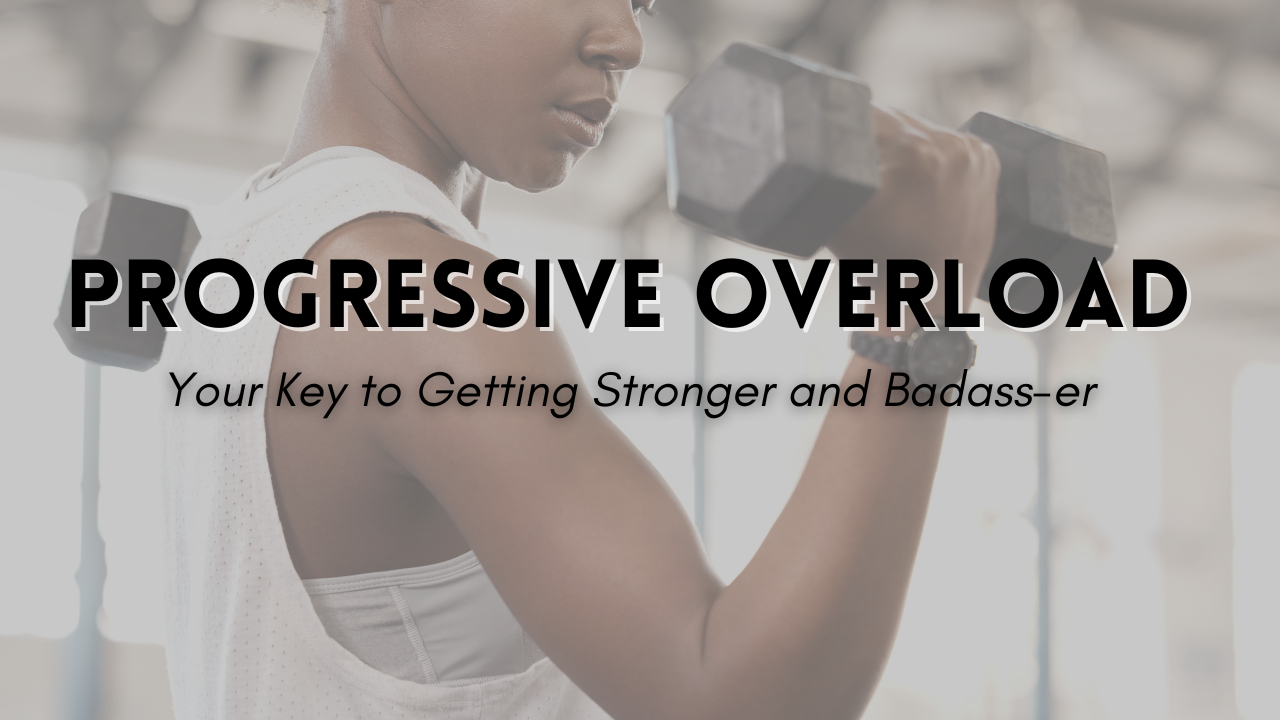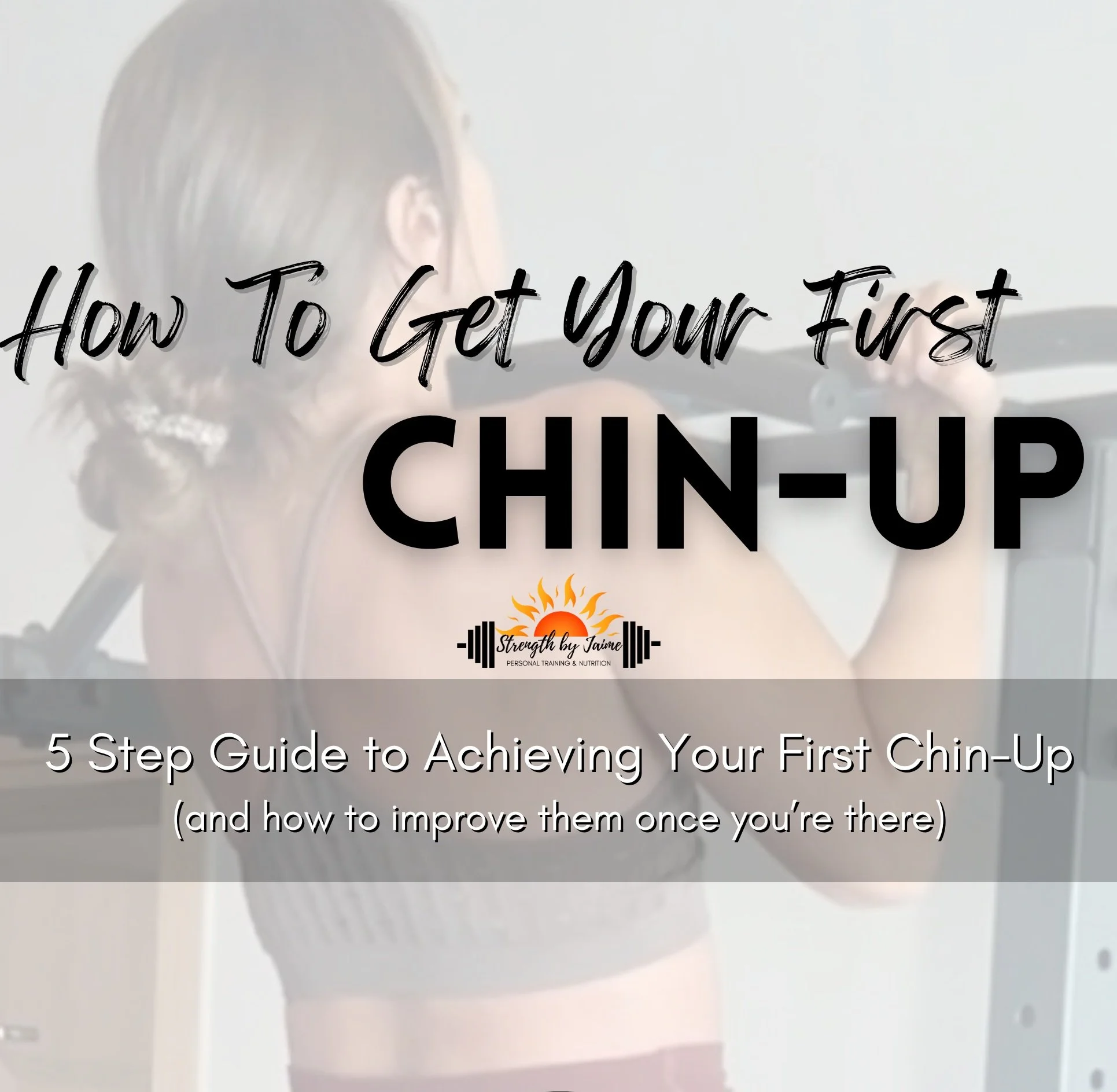Creatine For Women: Should You Take It?
(More of a audio learner? Watch to the video instead!)
When most women think of creatine, their minds go to the jacked men they see at the gym pounding protein shakes and lifting weights the size of small cars. Probably grunting. And doing other…manly things.
But guess what? Creatine isn’t just for the ‘bros’ - it’s for us women, too. Especially those of us who are over 35, crushing life but fighting to maintain muscle and bone density as we age, and maybe just looking for a little more OOMPH in the gym (and brainpower in the office).
Let’s break down what creatine actually is, what it can do for you (yes, you!), and why it’s about time you stop skipping the supplement aisle when you see it.
Spoiler: it’s more than a muscle-builder, and no, it’s not going to turn you into She-Hulk. So…sorry about that.
What Is Creatine?
Creatine helps to restore ATP, which is essentially a molecule that cells use for energy.
ATP stands for adenosine triphosphate. Think of ATP as the battery for your cells. When cells need to do something, like move or grow, they use the energy stored in ATP.
The molecule has three phosphate groups (hence the name TRIphosphate…), and when one of these groups is broken off, energy is released, and ATP becomes ADP (adenosine DIphosphate…see what happened there?). Cells then recharge ADP back into ATP, just like recharging a battery, so it can be used again.
It looks like this:
Creatine helps regenerate ATP through a molecule called creatine phosphate (or phosphocreatine). When we supplement with creatine monohydrate - the most studied and natural form of creatine we can get - each creatine molecule comes paired with a molecule of water (this is important, i’ll come back to it).
The creatine monohydrate molecule is converted to creatine phosphate once inside our muscle. Creatine is also naturally found in foods that have protein. However, supplementing will allow your body to essentially stock-pile this molecule so you have more of it then you would get through food alone.
Here's a simple explanation of how it works:
Storage: When your body is at rest, it stores extra energy in the form of creatine phosphate in muscles.
Energy Demand: During high-intensity, short-duration activities like sprinting or lifting weights, your muscles need a quick burst of energy.
Transfer of Phosphate: Creatine phosphate comes into play by quickly donating its phosphate group to ADP (adenosine diphosphate), converting it back into ATP (adenosine triphosphate).
Result: This process rapidly regenerates ATP, providing a quick source of energy to sustain muscle activity for a few more seconds.
In summary, creatine phosphate acts like a backup energy reserve, quickly helping to replenish ATP levels when they're depleted during intense exercise. Creatine as a supplement is one of the most pure, natural and well-researched fitness and health supplement on the market, and I recommend it to all of my virtual training and nutrition clients.
OK So, you should take it…but how much, when, how and where?!
For women, the daily recommended dose is 3-5 grams daily. While evidence supports the highest creatine absorbance immediately post-workout, consistency matters more. For example, taking creatine every single day in the morning when you first wake up will be more effective than a sporadic 3-4 days a week after your training sessions.
If you purchase creatine in powder form, you can throw it into a smoothie, electrolyte drink, or even your morning coffee (some of my virtual training clients do this though I am too scared to try it). Make sure you look for pure Creatine Monohydrate (not a BCAA/Creatine blend or any other pre-workout, hype-you-up, bro-shit). You can also find creatine capsules and gummies, though you’ll pay more for the convenient packaging.
As for where to buy it - I’ll make it easy for you. Head over to CreaPure to pay a little extra for a creatine that is 99% pure and water-washed (more on that below), or just head to Amazon or your closest vitamin shop to snag whatever is a good price. I can also recommend Legion Athletics for most supplements as they are great-tasting and made with quality ingredients and testing.
when will i notice a difference?
With creatine, you may or may not actually notice anything. Just how you don’t feel the inflamation leaving your body or the instand brain-power when supplementing with Omega 3s.
Noticeable Effects:
You may notice increased strength and ability to lift heavier weights or perform more reps. So where you were only able to eek out 3 reps of that deadlift, you might find a 4th comes easier than it was before.
Potentially faster recovery between sets and training days.
Slight increase in muscle mass due to better training performance.
What You Might Not Notice:
It won’t work like a stimulant (no immediate "boost" in energy). It works by taking it daily and consistently, not just on workout days or sporadically.
Effects are absolutely more gradual - results accumulate over weeks with consistent use and you may not even notice anything at all!
There is some wishy-washy evidence suggesting close to 25% of people may be creatine non-responders. However, the sample sizes for studies were small, and didn’t take into account changes in training or nutrition and so we still aren’t sure how valid this is. Therefore, if you start taking creatine and don’t notice anything…well, that’s kind of normal. But, you can try increasing to the top end range of the recommended daily dose (5g) and see how you feel.
Common Myths About Creatine for women
Myth 1: Creatine Causes Water Retention/Bloating/Weight Gain:
Yes, creatine supplementation can cause water retention. Remember that the creatine molecule that comes paired with a molecule of water? Yea, told you we’d revisit that. However, this retention is within muscles (intracellular), which can make your muscles look fuller, but will not cause subcutaneous (or under the skin) water retention.
As for bloating, this is only experienced by some women and is likely due to the way the creatine is processed vs the creatine itself. If you experience gastrointestinal discomfort when supplementing with creatine, it could be because you are more sensitive to the acid-washing processing of most creatine supplements. If this is you, or you want to get ahead of it, you can try a brand that uses a water-washing method instead of acid-washing for their creatine, like CreaPure (nope, not sponsored).
And the weight gain…as you probably figured out by now, intracellular water retention can cause an increase on the scale. However, hardly any of my female clients experienced this. And if they do, its only 1-3 pounds max and it levels out quickly - it is NOT fat-gain and therefore doesn’t matter.
Myth 2: Creatine Makes You Bulky:
Insert She-Hulk…Creatine is beneficial for both men and women and works the same way for both - that is, by not making them inherently bulky. Like I said, creatine may cause some water retention which can help fill out your muscles and make them pop a little more. Creatine can also help you build more strength and muscle mass. But it’s not a steroid or hormone and will not inherently make you bulky…in fact, you’ll still have to work your ass off just to sorta get a baby deltoid popping, so settle down She-Hulk…unfortunately, it’s not that easy.
Myth 3: Creatine Damages Kidneys:
There’s no evidence to suggest that creatine is harmful to kidneys in healthy individuals when taken at recommended doses.
Myth 4: Creatine is Only For People Who Lift Weights
Did you know that creatine supplementation can boost brain energy too? Creatine also increases ATP availability in the brain, which may support better cognitive function. Some studies even suggest creatine supplementation can reduce mental fatigue, especially in sleep-deprived situations, and may also support mood regulation in people with depression or mood disorders (or any of us with crazy busy mom-brain).
There is a lot of research coming out on the benefits of creatine for aging popualtions as well. Not only can creatine supplementation support muscle mass maintenance, strength and mobility, the growing research suggests creatine supplementation may also help protect against age-related cognitive decline, contributing to better brain health in aging adults.
If I had to guess, I believe creatine will make it into the standard daily supplementation of the every-day adult in the next 5-10 years, right up there with a multivitamin and Omega 3.
Myth 5: You Need to Start Creatine With a Loading Phase, and Cycle Off Of It Periodically
A creatine loading phase is when people take close to double the daily recommended dose of creatine for a week before dropping down to a maintenance dose. Being that it takes a good 4-5 weeks for creatine supplementation at a standard daily recommended dose (3-5g/day for women) to fully saturate your muscles, doing a loading phase where you take closer to 10-15g/day for a week before dropping down to the 3-5g dose from then on out can help speed up that process. However, it’s not necessary.
There is no evidence supporting the need to cycle off creatine supplementation.
Summary
Creatine isn’t magic, but it’s a no-brainer. It’s one of the most researched and effective supplements out there. Whether you’re a seasoned gym rat or a newbie looking to boost your training intensity, creatine might just be the sprinkle of fairy dust you need. Oh, and make sure to share it with your mother and grandmother (you can slip it in their coffee while you educate them on the benefits of building and maintaining muscle mass as a post-menopausal woman).
So next time you see that mysterious tub of white powder at the health store, you’ll know it’s not some mystical bro-streoid. It’s creatine, ready to help you unleash your inner She-Hulk (but unfortunately, probably won’t make you look like her…at least not yet). Now go forth and conquer those weights!
To Your Strength,
-Coach Jaime
Affordable Online Coaching? YES!
I have created a way to deliver optimal training programs, customized nutrition and connection-based coaching at a price that fits into any budget…It’s finally here, and you can join now for the Founder’s Rate. Snag it now because this is about to be HUGE.








